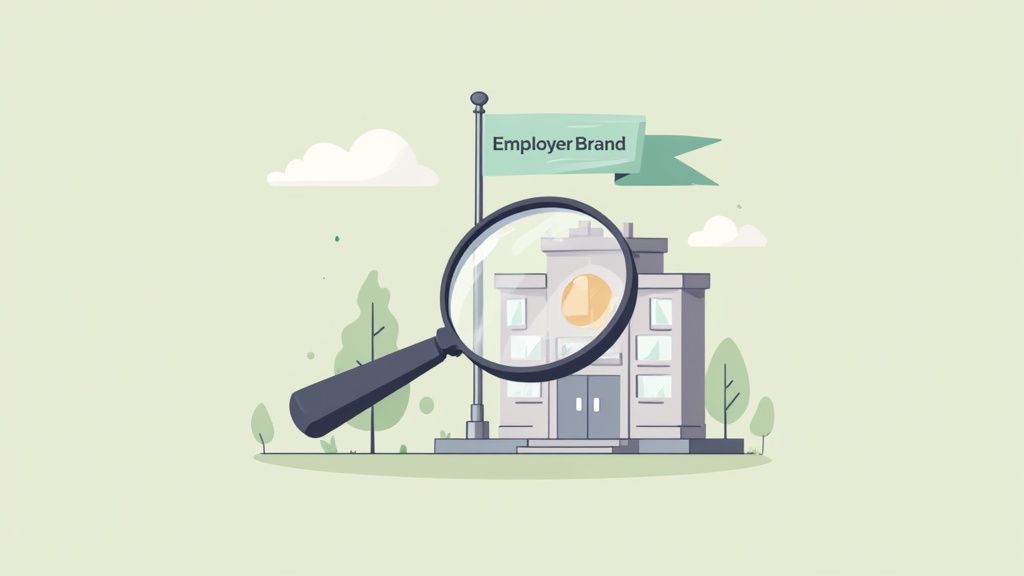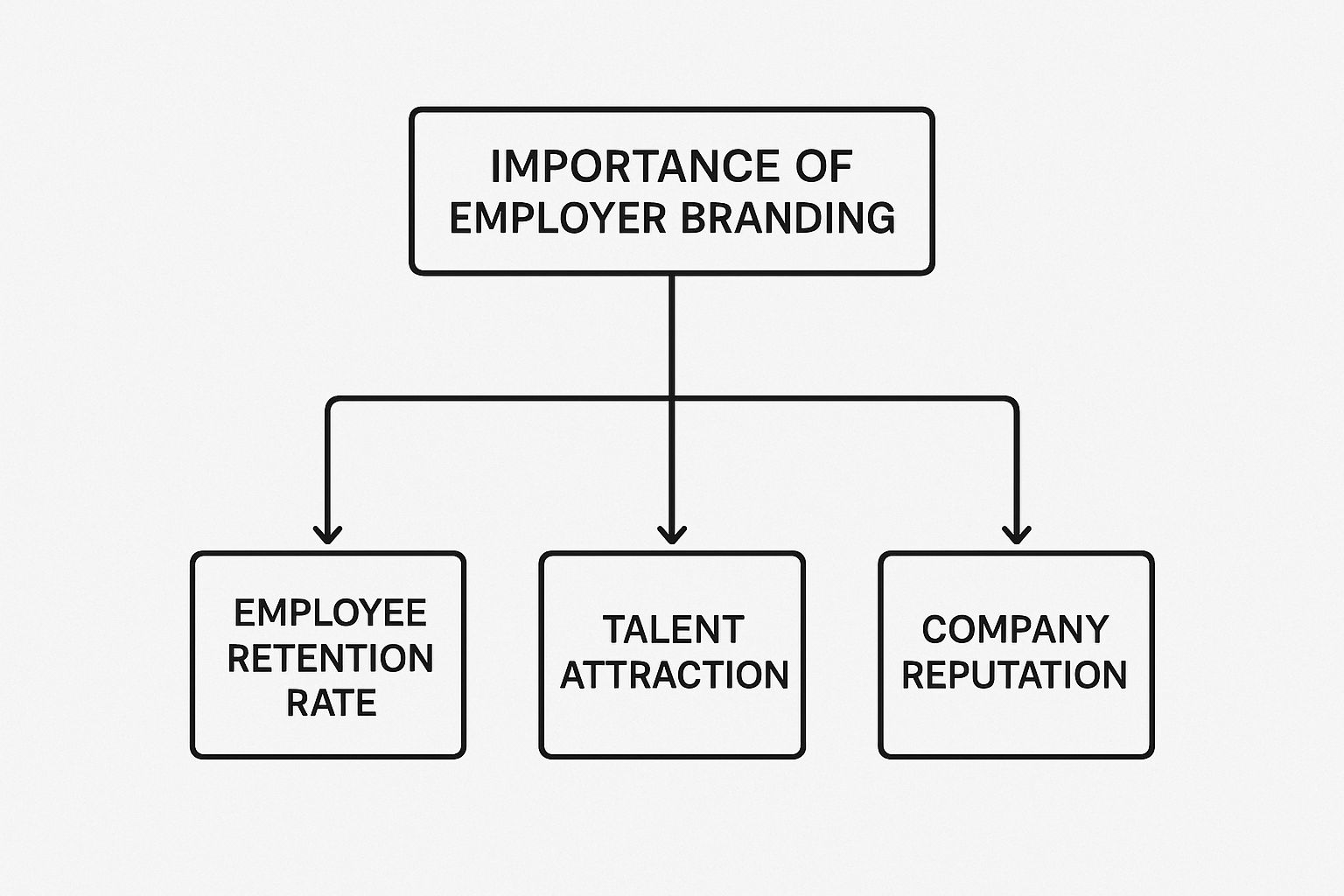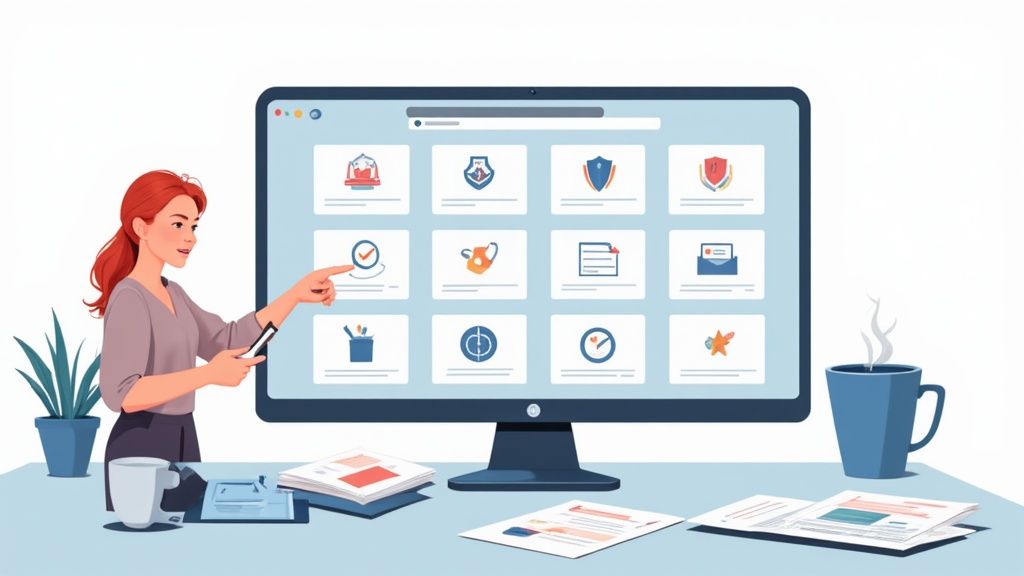What Is Employer Branding? Key Insights for Your Career

Think of a company’s employer brand as its reputation on the street. It’s the story people tell about what it’s really like to work there, long after the recruiters have gone home and the interview is over. This isn't about the flashy perks or a mission statement hanging on a wall; it's the genuine, lived-in experience of the people who clock in every day.
What Is Employer Branding, Really?

Just like a brand like Nike or Apple convinces you to buy their products, an employer brand convinces you to invest your time and talent with them. It’s the complete picture of a company as an employer, painted by its culture, its values, and the day-to-day reality its employees face.
Getting a handle on this gives you a massive advantage in your job search. It allows you to look past the polished careers page and corporate buzzwords to find a company culture that truly aligns with your ambitions and values. A strong employer brand acts like a magnet for the right people, creating a clear identity that makes top talent want to be part of the story.
The Impact on Your Job Search
This isn't just some fuzzy marketing concept; it directly shapes your career opportunities. The power of a great reputation is clear when you learn that 88% of job seekers consider a company's brand before they even think about applying.
In fact, about 75% of candidates now prioritize an employer’s reputation over a higher salary, which tells you just how critical this has become. You can dive into more employer branding statistics that are reshaping the modern job market.
This means the best companies don’t just sell products; they sell a compelling vision of what it’s like to be on their team. They build that reputation on a solid foundation of:
- Positive Employee Experiences: What are current and former employees actually saying on platforms like Glassdoor?
- Clear Company Values: Do the company’s stated values show up in its actions, leadership decisions, and daily operations?
- Growth Opportunities: Is the company known for investing in its people and helping them advance?
To help you get a clearer picture, this table breaks down the core components of an employer brand.
Key Elements of an Employer Brand at a Glance
By learning how to read these signals, you can move beyond simply finding a job and start strategically building a career at a company where you can genuinely thrive.
The Anatomy of a Strong Employer Brand
A powerful employer brand doesn’t just materialize out of thin air. It’s built, piece by piece, on top of a single, foundational promise. This promise is what we call the Employee Value Proposition (EVP)—it’s the unspoken deal between a company and its team.
At its heart, the EVP answers the one question every single candidate is thinking: "What’s in it for me if I work here?"
This central promise, however, needs to be backed up by real substance. Without a solid foundation, an EVP is just empty marketing chatter. These are the pillars that give it weight and credibility.
The Core Pillars of Employer Identity
First up is company culture. This isn't about ping-pong tables or free snacks; it's the real, day-to-day experience of working there. It’s how people communicate, how teams collaborate (or don't), and the general vibe of the office. Is it a place that encourages new ideas, or is it tangled up in red tape?
Next, you have the corporate values. These are the supposed guiding principles that should shape every decision, from who gets hired and promoted to how projects are managed. A company with a genuine brand actually lives by its values. A weak one just puts them on a poster in the breakroom.
Finally, there’s reputation. This is what the outside world thinks about the culture and values. It’s crafted from the stories current and former employees share on sites like Glassdoor and, just as importantly, through word-of-mouth. This raw, unfiltered feedback is often the most truthful look you’ll get. Gaining insight into what makes specific industries attractive, such as why working in Web3 is better than Web2, can reveal the kinds of unique value propositions that today’s professionals are looking for.
This visual shows exactly how these different components work together to deliver real business results.

As you can see, a strong employer brand has a direct line to attracting talent, keeping great people on board, and boosting the company’s overall reputation. When all these pieces click into place, they create a powerful workplace identity that either pulls in the right people or pushes the wrong ones away.
Take Salesforce, for example. Their EVP is centered around their ‘Ohana’ culture, which emphasizes a deep sense of family and community. By authentically living this brand, they saw a 28% increase in qualified job applications.
A company’s EVP is the sum of everything it offers its employees in return for their skills and commitment. When the culture, values, and reputation align, the brand becomes a powerful magnet for the right people.
Of course, companies are getting smarter about how they communicate their brand, often leaning on technology to get the message out. If you're curious about how tech is shaking up the hiring world, check out our guide on automation in talent acquisition.
Why This Matters for Your Career Success

The numbers don't lie. As this chart shows, job seekers are overwhelmingly looking at a company's reputation to decide where to work. Understanding what is employer branding isn't just for HR teams anymore—it's become an essential tool for navigating your own career path.
Think of a company's brand as your personal roadmap. A strong, positive one acts as a green flag, hinting at a healthy work environment, genuine opportunities for growth, and a culture that resonates with your own values. It tells you the company actually invests in its people and backs up its promises.
Conversely, a weak or negative brand is a massive red flag. It can be an early warning sign of a toxic workplace, high turnover, or a role that will stall your professional growth. By learning to read these signals, you can steer clear of frustrating dead-ends and focus your energy on companies where you can genuinely flourish.
Making Smarter Career Decisions
This is about more than just dodging a bad job; it's about actively seeking out a great one. When you learn to decipher an employer's brand, you shift from simply taking a paycheck to making strategic choices that build a fulfilling, long-term career.
A strong employer brand is basically a promise of a positive employee experience. When a company invests in its brand, it's signaling a real commitment to creating an environment where talented people want to stay and grow.
This knowledge puts you back in the driver's seat. You can confidently assess whether a company’s culture will champion your ambitions or stifle them. Ultimately, the goal is to find a job you love, and getting a feel for a company's brand is the first critical step.
If you're curious to see how this works from the other side, exploring common employer branding strategies when hiring can give you incredible insight into what modern companies are doing to attract top talent like you.
Great Employer Brands in the Real World
Seeing how the best companies do it is far more telling than just talking about theory. What you'll notice is that world-class employer branding isn't about having the deepest pockets. It’s about being incredibly clear, consistent, and genuine about what it truly means to be on the team.
Let's break down two completely different companies that absolutely nail it.
Patagonia: The Activist Employer
Patagonia’s entire identity as an employer is built on a bedrock of environmental activism. When you visit their career page, you aren't just looking at jobs—you're being invited to "work on saving our home planet." That's a powerful statement. It acts as a filter, attracting people who don't just want a paycheck but share a deep, personal commitment to the cause.
They back this up with real action, too, like famously offering to pay bail for employees arrested during peaceful environmental protests. This creates a bond that’s much stronger than a typical 9-to-5. For a job seeker, Patagonia sends an unmistakable signal: bring your values to work, because here, they matter.
Microsoft: The Innovator and Enabler
Microsoft takes a different approach, focusing its brand on innovation, global impact, and—crucially—flexibility. Their #MicrosoftLife social media campaign is a brilliant example of this in action. It's not a slick corporate ad; it's a window into the real, day-to-day experiences of their employees.
This humanizes a tech giant, making it feel approachable and real. You see people working on massive, world-changing projects one moment and enjoying their personal lives the next. The message is clear: at Microsoft, you can have a massive impact and a life outside of work.
Authenticity is a paramount factor for companies today. Millions are shifting to transparent communication and sharing genuine employee experiences to build trust. This often involves leveraging engaged employees as brand ambassadors to enhance the reach and credibility of employer messaging, a strategy you can learn more about by exploring the latest employer brand statistics.
These examples aren't just interesting stories; they're a blueprint. As you look for your next role, you can use these same principles to analyze the companies you’re considering. To learn exactly how to vet potential employers, check out our guide on how to research a company before you apply.
How to Become an Employer Brand Investigator

So, how do you see past the glossy corporate brochures and figure out what a company is really like? You have to put on your detective hat. Your mission is to move beyond the polished image and uncover the truth, ensuring the culture they advertise is the one employees actually experience.
Look for Patterns, Not Just Ratings
Your investigation starts with the unfiltered stories from current and former employees. Websites like Glassdoor and Comparably are goldmines, but you need to know how to sift through the information. Don't get fixated on the overall star rating.
Instead, dive deep into the written reviews. Look for recurring themes. Are dozens of people across different departments and years all saying the same thing about the amazing work-life balance? That's a strong signal. On the flip side, if you see consistent complaints about micromanagement or a lack of transparency, pay attention. One bad review might just be a disgruntled employee, but ten reviews telling the same story points to a genuine cultural issue.
Sift Through the Social Media Feed
Next, take your investigation to social media platforms like LinkedIn. Look for company-specific hashtags—think #LifeAtCompany or #CompanyCulture. The key here is to see who is posting. Is it all slick, branded content from the official corporate account, or are you seeing genuine posts from actual employees sharing their day-to-day experiences?
When a company's culture is authentic, you'll find its people are its biggest advocates, sharing their stories without being prompted. If the only cheerleaders are in the marketing department, it might be a sign that the vibrant culture they’re selling is just an illusion. This kind of research is one of many modern job search techniques that empower you to make smarter career decisions.
The goal is to verify, not just trust. A company’s character is revealed through its actions, not just its words. Look for consistency between what a company says it is and what its people experience daily.
Before you make any big decisions, having a structured approach can make all the difference. This checklist will help you organize your findings and spot potential red flags before you get too far down the road.
Your Employer Brand Research Checklist
By piecing together these different clues, you can move from simply hoping a company is a good fit to knowing it with confidence. You'll build a complete picture that lets you decide if their brand is one you'd be proud to be a part of.
Your Employer Branding Questions, Answered
If you're job hunting, you've probably heard the term "employer brand" tossed around. But what does it actually mean for you? Let's cut through the jargon and get straight to what matters.
Employer Brand vs. Company Culture
It helps to think about it like this: company culture is what happens inside the office walls. It’s the day-to-day reality of working there—the jokes, the meetings, the management style, the after-work drinks.
The employer brand is the story the company tells the outside world about that culture. When things are good, the brand is just an honest reflection of a great internal reality. The problems start when there's a disconnect. A company that talks a big game about work-life balance but has Glassdoor reviews full of burnout stories? That's a serious red flag.
How to Spot a Fake
So how do you tell if a brand is authentic or just a marketing gimmick? Look for contradictions.
Does their careers page feature stock photos of a diverse team, but a quick LinkedIn search shows a leadership board that all looks the same? Does the CEO’s latest blog post praise transparency, while employees on review sites complain that no one ever knows what’s going on?
An authentic brand feels consistent everywhere you look. It's built on proof, not just promises. Be wary of feel-good but empty phrases like "we're a family"—look for concrete examples of how they support their people.
The interview process itself is one of your best clues. If their brand promises a modern, respectful, and efficient workplace, but your interviews are a chaotic, disorganized mess, believe what you see, not what they say. This is where your own prep comes in handy. Knowing how to prepare for a behavioral interview helps you turn the tables and evaluate them based on the respect they show you as a candidate.
Can Small Companies Have a Strong Brand?
Absolutely! And honestly, sometimes they have the strongest ones.
A great employer brand isn't about having a massive marketing budget. It's about building a fantastic reputation, one happy employee at a time. A small startup with an amazing culture, a clear mission, and a team that is genuinely excited to be there can create a powerful brand through simple word-of-mouth. That kind of authentic buzz is often far more convincing than a splashy ad campaign from a corporate giant.
Ready to take control of your job search and stand out to companies with great employer brands? AIApply provides the tools you need, from AI-powered resume building to automated job applications, helping you land your next great role faster. Visit https://aiapply.co to begin.
Think of a company’s employer brand as its reputation on the street. It’s the story people tell about what it’s really like to work there, long after the recruiters have gone home and the interview is over. This isn't about the flashy perks or a mission statement hanging on a wall; it's the genuine, lived-in experience of the people who clock in every day.
What Is Employer Branding, Really?

Just like a brand like Nike or Apple convinces you to buy their products, an employer brand convinces you to invest your time and talent with them. It’s the complete picture of a company as an employer, painted by its culture, its values, and the day-to-day reality its employees face.
Getting a handle on this gives you a massive advantage in your job search. It allows you to look past the polished careers page and corporate buzzwords to find a company culture that truly aligns with your ambitions and values. A strong employer brand acts like a magnet for the right people, creating a clear identity that makes top talent want to be part of the story.
The Impact on Your Job Search
This isn't just some fuzzy marketing concept; it directly shapes your career opportunities. The power of a great reputation is clear when you learn that 88% of job seekers consider a company's brand before they even think about applying.
In fact, about 75% of candidates now prioritize an employer’s reputation over a higher salary, which tells you just how critical this has become. You can dive into more employer branding statistics that are reshaping the modern job market.
This means the best companies don’t just sell products; they sell a compelling vision of what it’s like to be on their team. They build that reputation on a solid foundation of:
- Positive Employee Experiences: What are current and former employees actually saying on platforms like Glassdoor?
- Clear Company Values: Do the company’s stated values show up in its actions, leadership decisions, and daily operations?
- Growth Opportunities: Is the company known for investing in its people and helping them advance?
To help you get a clearer picture, this table breaks down the core components of an employer brand.
Key Elements of an Employer Brand at a Glance
By learning how to read these signals, you can move beyond simply finding a job and start strategically building a career at a company where you can genuinely thrive.
The Anatomy of a Strong Employer Brand
A powerful employer brand doesn’t just materialize out of thin air. It’s built, piece by piece, on top of a single, foundational promise. This promise is what we call the Employee Value Proposition (EVP)—it’s the unspoken deal between a company and its team.
At its heart, the EVP answers the one question every single candidate is thinking: "What’s in it for me if I work here?"
This central promise, however, needs to be backed up by real substance. Without a solid foundation, an EVP is just empty marketing chatter. These are the pillars that give it weight and credibility.
The Core Pillars of Employer Identity
First up is company culture. This isn't about ping-pong tables or free snacks; it's the real, day-to-day experience of working there. It’s how people communicate, how teams collaborate (or don't), and the general vibe of the office. Is it a place that encourages new ideas, or is it tangled up in red tape?
Next, you have the corporate values. These are the supposed guiding principles that should shape every decision, from who gets hired and promoted to how projects are managed. A company with a genuine brand actually lives by its values. A weak one just puts them on a poster in the breakroom.
Finally, there’s reputation. This is what the outside world thinks about the culture and values. It’s crafted from the stories current and former employees share on sites like Glassdoor and, just as importantly, through word-of-mouth. This raw, unfiltered feedback is often the most truthful look you’ll get. Gaining insight into what makes specific industries attractive, such as why working in Web3 is better than Web2, can reveal the kinds of unique value propositions that today’s professionals are looking for.
This visual shows exactly how these different components work together to deliver real business results.

As you can see, a strong employer brand has a direct line to attracting talent, keeping great people on board, and boosting the company’s overall reputation. When all these pieces click into place, they create a powerful workplace identity that either pulls in the right people or pushes the wrong ones away.
Take Salesforce, for example. Their EVP is centered around their ‘Ohana’ culture, which emphasizes a deep sense of family and community. By authentically living this brand, they saw a 28% increase in qualified job applications.
A company’s EVP is the sum of everything it offers its employees in return for their skills and commitment. When the culture, values, and reputation align, the brand becomes a powerful magnet for the right people.
Of course, companies are getting smarter about how they communicate their brand, often leaning on technology to get the message out. If you're curious about how tech is shaking up the hiring world, check out our guide on automation in talent acquisition.
Why This Matters for Your Career Success

The numbers don't lie. As this chart shows, job seekers are overwhelmingly looking at a company's reputation to decide where to work. Understanding what is employer branding isn't just for HR teams anymore—it's become an essential tool for navigating your own career path.
Think of a company's brand as your personal roadmap. A strong, positive one acts as a green flag, hinting at a healthy work environment, genuine opportunities for growth, and a culture that resonates with your own values. It tells you the company actually invests in its people and backs up its promises.
Conversely, a weak or negative brand is a massive red flag. It can be an early warning sign of a toxic workplace, high turnover, or a role that will stall your professional growth. By learning to read these signals, you can steer clear of frustrating dead-ends and focus your energy on companies where you can genuinely flourish.
Making Smarter Career Decisions
This is about more than just dodging a bad job; it's about actively seeking out a great one. When you learn to decipher an employer's brand, you shift from simply taking a paycheck to making strategic choices that build a fulfilling, long-term career.
A strong employer brand is basically a promise of a positive employee experience. When a company invests in its brand, it's signaling a real commitment to creating an environment where talented people want to stay and grow.
This knowledge puts you back in the driver's seat. You can confidently assess whether a company’s culture will champion your ambitions or stifle them. Ultimately, the goal is to find a job you love, and getting a feel for a company's brand is the first critical step.
If you're curious to see how this works from the other side, exploring common employer branding strategies when hiring can give you incredible insight into what modern companies are doing to attract top talent like you.
Great Employer Brands in the Real World
Seeing how the best companies do it is far more telling than just talking about theory. What you'll notice is that world-class employer branding isn't about having the deepest pockets. It’s about being incredibly clear, consistent, and genuine about what it truly means to be on the team.
Let's break down two completely different companies that absolutely nail it.
Patagonia: The Activist Employer
Patagonia’s entire identity as an employer is built on a bedrock of environmental activism. When you visit their career page, you aren't just looking at jobs—you're being invited to "work on saving our home planet." That's a powerful statement. It acts as a filter, attracting people who don't just want a paycheck but share a deep, personal commitment to the cause.
They back this up with real action, too, like famously offering to pay bail for employees arrested during peaceful environmental protests. This creates a bond that’s much stronger than a typical 9-to-5. For a job seeker, Patagonia sends an unmistakable signal: bring your values to work, because here, they matter.
Microsoft: The Innovator and Enabler
Microsoft takes a different approach, focusing its brand on innovation, global impact, and—crucially—flexibility. Their #MicrosoftLife social media campaign is a brilliant example of this in action. It's not a slick corporate ad; it's a window into the real, day-to-day experiences of their employees.
This humanizes a tech giant, making it feel approachable and real. You see people working on massive, world-changing projects one moment and enjoying their personal lives the next. The message is clear: at Microsoft, you can have a massive impact and a life outside of work.
Authenticity is a paramount factor for companies today. Millions are shifting to transparent communication and sharing genuine employee experiences to build trust. This often involves leveraging engaged employees as brand ambassadors to enhance the reach and credibility of employer messaging, a strategy you can learn more about by exploring the latest employer brand statistics.
These examples aren't just interesting stories; they're a blueprint. As you look for your next role, you can use these same principles to analyze the companies you’re considering. To learn exactly how to vet potential employers, check out our guide on how to research a company before you apply.
How to Become an Employer Brand Investigator

So, how do you see past the glossy corporate brochures and figure out what a company is really like? You have to put on your detective hat. Your mission is to move beyond the polished image and uncover the truth, ensuring the culture they advertise is the one employees actually experience.
Look for Patterns, Not Just Ratings
Your investigation starts with the unfiltered stories from current and former employees. Websites like Glassdoor and Comparably are goldmines, but you need to know how to sift through the information. Don't get fixated on the overall star rating.
Instead, dive deep into the written reviews. Look for recurring themes. Are dozens of people across different departments and years all saying the same thing about the amazing work-life balance? That's a strong signal. On the flip side, if you see consistent complaints about micromanagement or a lack of transparency, pay attention. One bad review might just be a disgruntled employee, but ten reviews telling the same story points to a genuine cultural issue.
Sift Through the Social Media Feed
Next, take your investigation to social media platforms like LinkedIn. Look for company-specific hashtags—think #LifeAtCompany or #CompanyCulture. The key here is to see who is posting. Is it all slick, branded content from the official corporate account, or are you seeing genuine posts from actual employees sharing their day-to-day experiences?
When a company's culture is authentic, you'll find its people are its biggest advocates, sharing their stories without being prompted. If the only cheerleaders are in the marketing department, it might be a sign that the vibrant culture they’re selling is just an illusion. This kind of research is one of many modern job search techniques that empower you to make smarter career decisions.
The goal is to verify, not just trust. A company’s character is revealed through its actions, not just its words. Look for consistency between what a company says it is and what its people experience daily.
Before you make any big decisions, having a structured approach can make all the difference. This checklist will help you organize your findings and spot potential red flags before you get too far down the road.
Your Employer Brand Research Checklist
By piecing together these different clues, you can move from simply hoping a company is a good fit to knowing it with confidence. You'll build a complete picture that lets you decide if their brand is one you'd be proud to be a part of.
Your Employer Branding Questions, Answered
If you're job hunting, you've probably heard the term "employer brand" tossed around. But what does it actually mean for you? Let's cut through the jargon and get straight to what matters.
Employer Brand vs. Company Culture
It helps to think about it like this: company culture is what happens inside the office walls. It’s the day-to-day reality of working there—the jokes, the meetings, the management style, the after-work drinks.
The employer brand is the story the company tells the outside world about that culture. When things are good, the brand is just an honest reflection of a great internal reality. The problems start when there's a disconnect. A company that talks a big game about work-life balance but has Glassdoor reviews full of burnout stories? That's a serious red flag.
How to Spot a Fake
So how do you tell if a brand is authentic or just a marketing gimmick? Look for contradictions.
Does their careers page feature stock photos of a diverse team, but a quick LinkedIn search shows a leadership board that all looks the same? Does the CEO’s latest blog post praise transparency, while employees on review sites complain that no one ever knows what’s going on?
An authentic brand feels consistent everywhere you look. It's built on proof, not just promises. Be wary of feel-good but empty phrases like "we're a family"—look for concrete examples of how they support their people.
The interview process itself is one of your best clues. If their brand promises a modern, respectful, and efficient workplace, but your interviews are a chaotic, disorganized mess, believe what you see, not what they say. This is where your own prep comes in handy. Knowing how to prepare for a behavioral interview helps you turn the tables and evaluate them based on the respect they show you as a candidate.
Can Small Companies Have a Strong Brand?
Absolutely! And honestly, sometimes they have the strongest ones.
A great employer brand isn't about having a massive marketing budget. It's about building a fantastic reputation, one happy employee at a time. A small startup with an amazing culture, a clear mission, and a team that is genuinely excited to be there can create a powerful brand through simple word-of-mouth. That kind of authentic buzz is often far more convincing than a splashy ad campaign from a corporate giant.
Ready to take control of your job search and stand out to companies with great employer brands? AIApply provides the tools you need, from AI-powered resume building to automated job applications, helping you land your next great role faster. Visit https://aiapply.co to begin.
Don't miss out on
your next opportunity.
Create and send applications in seconds, not hours.







